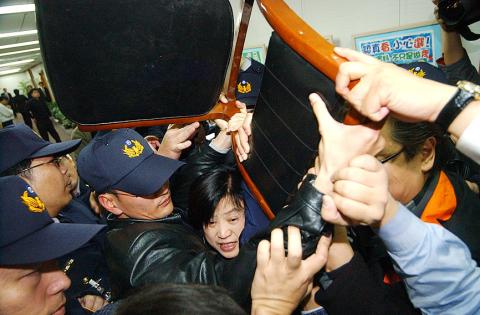|
Court clears pan-blue lawmakers
By Yang Kuo-wen / Staff reporter

A scuffle takes place outside the
Central Election Commission headquarters in Taipei on March 26, 2004. Three
pan-blue lawmakers were yesterday found not guilty of violating the Assembly and
Parade Act in connection with the incident.
Photo: Liu Hsin-de, Taipei Times
The Taiwan High Court yesterday handed a
not guilty verdict to a group of pan-blue lawmakers who were charged with
violating the Assembly and Parade Act (集會遊行法) in March 2004 and accused of
leading supporters in a violent rampage outside the Central Election Commission
(CEC).
Chinese Nationalist Party (KMT) Legislator Lee Ching-hua (李慶華), former KMT
legislator Chiu Yi (邱毅) and former People First Party (PFP) legislator Feng
Ting-kuo (馮定國) were found not guilty, while the charges against late PFP
legislator Lin Huei-kwung (林惠官) were dropped after he passed away in August
2009.
Lee, Chiu, Feng and Lin — all lawmakers at the time — mobilized a crowd and
staged a protest outside the CEC building on March 26, 2004, prior to the
commission’s declaration of the result of the 2004 presidential election, when
then-president Chen Shui-bian (陳水扁) and then-vice president Annette Lu (呂秀蓮) of
the Democratic Progressive Party (DPP) won a second term.
Then-KMT presidential candidate Lien Chan (連戰) lost the race to Chen by a
razor-thin margin of fewer than 30,000 votes — or 0.228 percent of the vote.
The four insisted there were controversies left over from the 2004 presidential
election and that Chen and Lu should not have been officially declared the
winners of their re-election bid.
After the four were invited into the building, a crowd attacked the CEC
building, throwing eggs and breaking glass doors and windows, despite police
three times asking them to leave the premises and disperse.
The four were prosecuted for violating the Assembly and Parade Act and were
sentenced to three months in jail by the Taipei District Court.
Meanwhile, Chiu, Feng and Lin received an additional sentence of 25 days in
detention for insulting a government office.
When the case was appealed to the Taiwan High Court, Lee, Chiu and Feng all
denied the charges, saying the did not mobilize the crowd and they were not
there when police requested that the crowd disperse and so could not be
considered responsible.
The court yesterday said that there was no evidence that the four were the
leaders of the demonstration and that they were not present when the conflict
occurred, hence Lee, Chiu and Feng were declared not guilty.
Responding to the verdict, Lee said through his office aide that the prosecution
was a politically motivated one and he was happy that the eight-year legal
battle had ended in a victory.
Court verdicts relating to recent violations of the Assembly and Parade Act:
1. In 2008, former Taiwan Association for Human Rights chairman Lin Chia-fan
(林佳範) was indicted for leading a demonstration in front of the Legislative Yuan
calling for amendments to the Assembly and Parade Act during the Wild
Strawberries Student Movement, when Association for Relations Across the Taiwan
Straits Chairman Chen Yunlin (陳雲林) visited Taiwan.
Lin was acquitted of violating the Assembly and Parade Act on Feb. 23.
2. In 2006, charges were filed against red-shirt campaign leader Shih
Ming-teh (施明德) and 15 others for violation of the Act after they launched a
campaign which sought to force then-president Chen Shui-bian (陳水扁) from office.
Although the Taipei District Court ruled that Shih and the others were not
guilty, the prosecution appealed to the High Court. Shih and the 15 other
defendants were found not guilty by the High Court on April 8, 2010.
3. In May 2007, then-People First Party Legislator Fu Kun-chi led a
protest in front of the Environmental Protection Administration, calling for
construction of the Suao-Hualien Freeway. When Fu led protesters to the Control
Yuan on the way to submit his petition to the Executive Yuan, the police said
the assembly had gone beyond the geographical bounds of the original
application, indicating that the area was beyond the legal scope for assembly.
The Taipei District Court sentenced Fu to 55 days in jail on the grounds that
“the assembly did not disband when ordered to do so by the authorities, and
disregarded such instructions despite numerous warnings.”
In November 2008, the High Court denied Fu’s appeal and that ruling was final.
4. Former Green Party chairman Kao Cheng-yan (高成炎) staged a protest at
the intersection of Zhongshan S Road and Renai Road in Taipei City in April
1994, criticizing the Chinese Nationalist Party (KMT) for tearing down its
central party headquarters and erecting a new building. During his sit-in, Kao
called a radio station and asked for the assistance of taxi drivers. Former
Taiwan Tribune deputy editor-in-chief Chang Chin-tse (張金策) and Lin Cheng-Hsiu
(林正修) went with the taxi driver supporters to Chiang Kai-shek Memorial Hall and
were suspected of vandalizing public property inside the hall. Kao was given a
final sentence of three months in jail or a fine. He refused to pay the fine and
was subsequently jailed.
5. In January 2010, National Taiwan University professor Tsay Ting-kuei
(蔡丁貴), who at the time had already been subjected to 28 fines totaling
NT$840,000 for violating the Act, was charged with preventing public servants
from carrying out their duties after being arrested by police when protesting in
front of the Presidential Office.
In the first trial, Tsay was found not guilty because of insufficient evidence,
but after the High Court re-examined a CD containing new evidence, it determined
that he had clearly obstructed civil servants from doing their duty and handed
down a final sentence of 30 days in prison or a NT$30,000 fine.
Information compiled by staff reporter Lin Ching-chuan
Translated by Jake Chung, Staff Writer
|
![]()
![]()
![]()